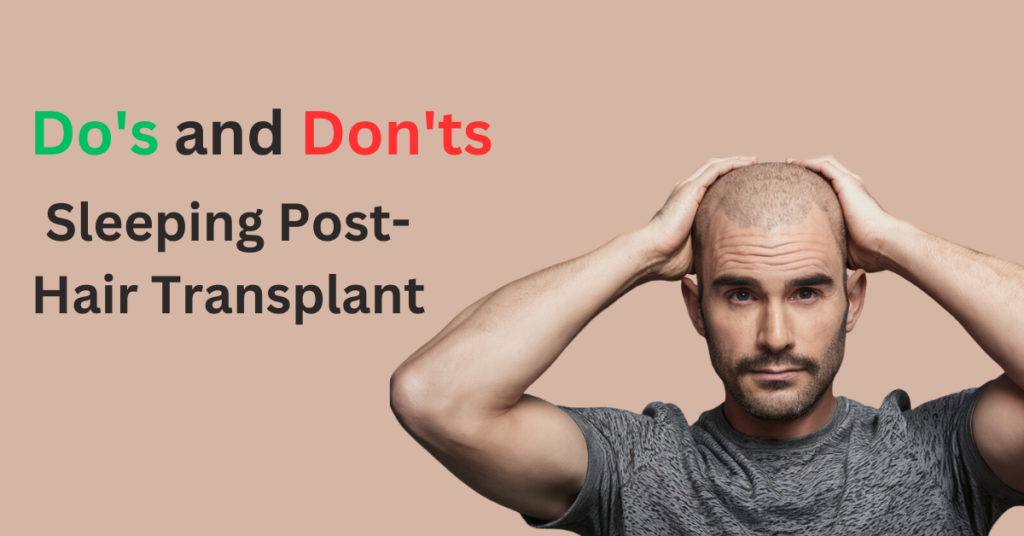Due to lifestyle changes or hormonal imbalances, most of the youngsters face the issue of hair loss. Fortunately, hair transplantation treatment helps them to recover their lost hair. But in the initial days of treatment, it hampers sleep quality.
If you have done the hair loss treatment recently then you know how it feels. You should be careful because the first 10 days are most crucial for new hair follicles. The unknown friction or touch can damage hair grafts. So thinking about how to sleep after a hair transplant is right, you should sleep in the right and comfortable position to avoid any stress to your hair and body.
Let’s know how to sleep after the hair transplant and what you should do after the hair transplant.
Best Position To Sleep After Hair Transplant
As per the best dermatologist in NJ, you should sleep on your back and your head should be elevated around a 45-degree angle. Use a U-shaped pillow or a towel under your neck to make a comfortable position to keep your head at the right angle. Keep your body in one line from shoulders to feet, do not move to the sides. Try to sleep alone so that no one can unintentionally touch your hair grafts.
Surely, sleeping in this position is a little bit tough. But after two or three days, it becomes easier for you to sleep in this position.
When Can We Sleep on the Side After a Hair Transplant?
Sleeping on the back with an elevated head is difficult for most people. It also hampers the sleep quality, but to save your newly transplanted hair, you need to bear this awkward position at least for 10 to 14 days. You will have to sleep like this until your hair glands heal properly. The Hair Loss Doctor suggests that the first two weeks are crucial for a hair transplant. But when you use a neck pillow it gives complete comfort in keeping your head straight. You can sleep on your sides after 2 weeks when there is no swelling on your head.
Can’t Sleep After Hair Transplant
Sleeping on the first day is horrible, with discomfort, a little pain as well the fear of damaging the hair follicles in the mind. The priority of the patient is to secure the donor area from being touched or harmed. The medication effect or inflammation hampers sleep. But somehow people try to sleep on a chair or sofa with a neck pillow or rolled-out towel under the neck but are unable to sleep. Don’t worry, this trouble is temporary, the first week will surely be difficult for you but when your body starts to heal properly, you will feel good. But still after a week you are facing a sleep issue then you must consult with a dermatologist near Moorestown, NJ for the best advice.
Blood on Pillow After Hair Transplant
Don’t panic or worry when you see a little bit of blood after waking up on your pillow. This is normal on the day of treatment. Simply gently clean with a cotton bud but don’t pressurize the treated area. Sometimes the hair grafts accidentally come out, in that case, you need to consult the dermatologist. You should also maintain an aftercare routine to avoid the side effects of hair transplant.
Sleeping Post-Hair Transplant: Dos and Don’ts

Here are some dos and don’ts to keep in mind:
What You Should Do:
- When you’re sleeping, make sure you prop yourself up a bit, like at a 45-degree angle. This will help reduce any swelling and keep pressure off your new hair grafts.
- Use a really soft pillowcase, like one made of silk or satin. These smooth fabrics won’t rub against your scalp and disturb your new hair follicles.
- Take it slow when you’re shifting around in bed. No sudden movements that could accidentally yank out your new hairs!
What You Shouldn’t Do:
- Don’t touch, scratch, or pick at your scalp where the transplant was done. It might be tempting if it feels itchy, but you could accidentally pull out the grafts.
- Don’t shove your pillows around too hard. You don’t want to accidentally whack your head and disturb those new hairs.
- Stay away from tight hats or caps that could rub against your scalp. That friction could damage your grafts.
- Don’t sleep on your stomach or face down. That would squish your head against the pillow, and you don’t want that pressure on your new hair follicles.
How to Care for Your Hair After The Transplant
As per the Hair Loss Doctor in Moorestown, about 80 to 95% of hair loss treatments are successful. Those are unsuccessful because of unprofessional treatment or not maintaining proper aftercare routine. To make your hair transplant successful, follow the given below aftercare routine.
Aftercare Routine of Hair Transplant
- Get your aftercare kit from the dermatologist
- Sprinkle Spray to hydrate your head to avoid any kind of infestation or scrubbing
- Safe your head from dust, humidity, or heat
- Drink lots of Water all day to quickly heal
- Avoid physical activity
- Take complete rest to recover fast
- Avoid smoking and drinking
- After one week, Gently wash your head but don’t use shampoo.
- After the two-week consultation with your dermatologist.
Hair follicles take time to settle and grow, it will take about 4 to 6 months to see effective results. Therefore regular consultation with a hair loss doctor in Moorestown helps you to get perfect guidance.
Final Thoughts
Definitely, sleeping is a challenging task after a hair transplant. But the above methods and tricks will surely help you to sleep comfortably. The scalp will take time to cure but if you are still facing sleeping issues then you must consult with our dermatologist in NJ at Meta Dermatology, where you’ll get professional guidance that help you to identify the causes behind your sleeping troubles and provide you with the best solutions as per your condition.
